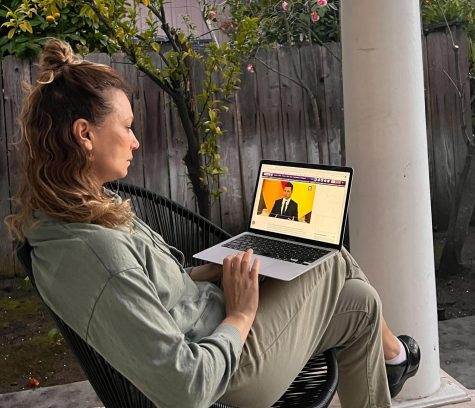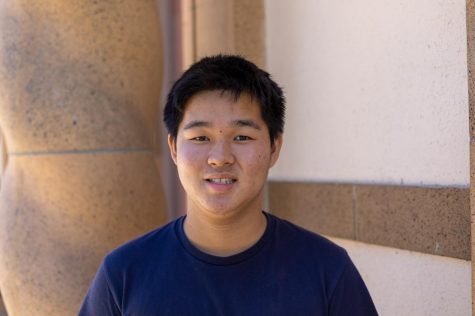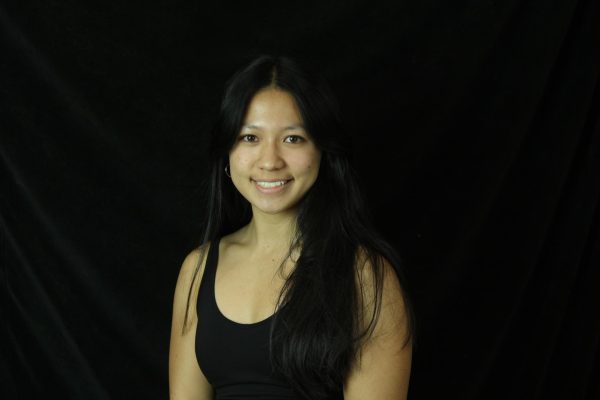Palo Alto reacts to Russia-Ukraine border crisis
February 17, 2022

Editor’s Note: Carolina Abbassi is a parent of a current Paly Voice staff member.
The Paly Voice sat down with members of the Palo Alto High School community to get reactions to the growing tensions between Russia and NATO after an increase in Russian troop movements along the Ukrainian border. The increased military presence has resulted in NATO deploying troops to the area and U.S. President Joe Biden participating in diplomatic discussions with Russian President Vladimir Putin.
According to Paly history teacher Justin Cronin, unease between the countries is increasing in anticipation of a Russian invasion. Cronin says Russia is looking to expand its territory and is currently building up troops for a potential invasion in a predominately Russian speaking region in Ukraine. This is not the first time Russia has looked into invading surrounding countries. Notably Russia invaded and subsequently annexed Crimea in 2014.
According to Cronin, Russia’s aggression is an attempt to bar Ukraine from joining NATO.
“Since Russia is no longer the Soviet Union, they don’t have the Warsaw Pact, which was the Soviet Union’s way of offsetting NATO,” Cronin said.
According to senior Lily Lochhead, whose grandparents lived in Ukraine for two years but left as a result of the countries’ hostilities, the tensions between the two nations have been going on for many years.
“They [Lochhead’s grandparents] ended up evacuating then [2014] when Putin first invaded Ukraine,” Lochhead said. “It wasn’t big on the news, but tensions were definitely there and we were paying attention to make sure there wasn’t anything new like war.”
According to Lochhead, it was difficult to leave the country in 2014 as officials wanted to prevent a mass departure of people. The possibility of war has been preventing Lochhead’s grandparents from returning to Ukraine since their evacuation.
“They just took what they could carry in their suitcase and they had to leave everything there,” Lochhead said. “For the most part, they had to rebuy everything because they couldn’t go back to get their stuff even when tensions were low.”
Although antagonism between Russia and Ukraine have been high for years, it has only recently began to receive widespread media attention, according to Lochhead.
“I think it’s just really interesting how everyone’s talking about Ukraine and World War III, and all of the other huge things that are going on,” Lochhead said. “That’s kind of been in my life for a long time, even though it’s kind of died down a bit.”
Cronin said NATO’s increase in military activity near Ukraine was necessary, but should be managed carefully.
“On one hand, it can be a deterrent,” Cronin said. “But in being a deterrent, all it takes is one mistake and you could end up in a full-fledged war.”
According to Cronin, the United States should avoid putting American troops into the conflict.
“Once the United States puts its troops on the ground, it creates a different dynamic than if it’s a UN coalition,” Cronin said. “A UN coalition says to Russia, it’s not just the United States. It doesn’t become just one-on-one.”
For Paly parent Carolina Abbassi, who was born in Ukraine, Russian motives are still unclear and worrying for Ukraine citizens.
“The current situation in Ukraine is very terrifying,” Abbassi stated in an email to The Paly Voice. “I really don’t understand President Putin’s intentions. I hope Putin is just trying to show off his military power and then will peacefully de-escalate and let the Russian troops go home.”
According to Abbassi, Ukrainian citizens are gearing up for the worst-case scenario.
“I still have friends and relatives who live there,” Abbassi stated. “Some of my friends there are preparing for the worst. They are going to special military training on how to handle guns and perform first aid.”
Abbassi stated that she was worried the conflict would forever divide Ukrainians and Russians.
“A lot of my friends have relatives in Russia and are in a bit of shock about the idea that Russian civilians would support their president in this,” Abbassi stated. “I am also worried that in the event of a war, afterward Ukrainians will never again consider Russians as their brothers the way they do now.”



